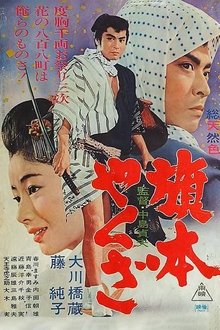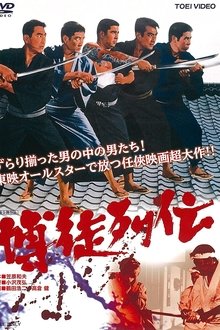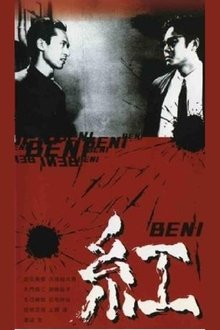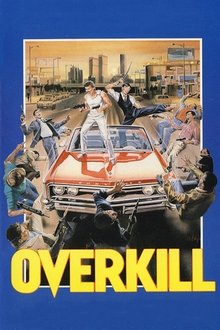After a major conflict, Kazuma Washio (Hitoshi Ozawa) becomes the 6th boss of Tendokai, Kanto’s largest yakuza group. Wakagashira Date (Hideo Nakano) and Kurata (Yoshiyuki Yamaguchi) secure casino rights from the government, but top officials are soon murdered, and Date is framed. The trail leads to Sanko-kai, a Kansai syndicate forming ties with a Korean underworld led by Myojin Akinari (Noboru Kaneko), brother of Washio’s old rival. Sanko-kai’s boss Onizuka (Hiroshi Fuse), who holds a grudge against Washio, launches a political and violent offensive. As Tendokai fights back to reclaim the casino rights, tragedy strikes—Okita (Yasukaze Motomiya) is targeted. Japan’s largest underworld war erupts again—what awaits at the end?
Related Movies
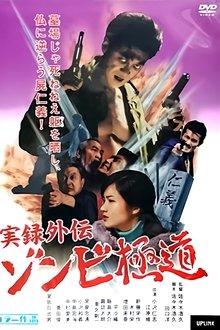
Yakuza Zombie (2001)
Yakuza Zombie opens with an introduction to a mysterious Yakuza graveyard deep in the forest, and a story of the baddest Yakuza of them all, Naruo Ryuuji (shown in cut scenes played by Ozawa Hitoshi). Naruo Ryuuji was a fearless killer who eventually got into heroin and, exactly like Ishimatsu Rikuo in Takashi Miike's Graveyard of Honor, eventually leaps to his death from the top of a prison, claiming he'll be back. I'm assuming this is a reference to real life crazy Yakuza Ishikawa Rikio, whom the original Graveyard of Honor was based on. It's established that the corpse of the fierce Yakuza Ryuuji is buried in the graveyard beneath a marker with the Japanese characters "Jingi" (Honor), and then we are taken to the modern day.
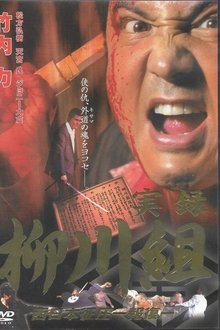
Mafia Family Yanagawa - Part 2 (2002)
The movie is set one year after the events of Mafia Family Yanagawa - Part 1, in which 8 Yanagawas faced off against 100 Devil Dragons in an epic bloody battle. Jiro Yanagawa (Takeuchi Riki) continues his feud with the Devil Dragons as he attempts to usurp their western territory.
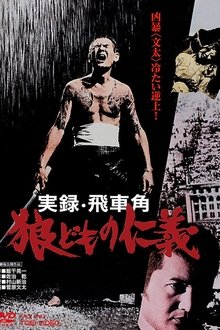
Code of Wolves (1974)
In gangster-infested 1920s Yokohama, gambler Ishiguro gets in with the local gang -- but his view of life changes after the Great Kanto Earthquake.
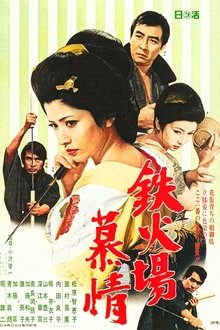
Gambling Den Desire (1970)
In a small town on the Kasumigaura coast in the early Showa period, the Masukawa clan from Tokyo is trying to take away the interests of the local Isetoku family. Setsuko, the adopted daughter of the Isetoku family, falls in love with Seijiro, a travelling raven she meets on a whim. However, Koide, a businessman connected to the Masukawa clan, wants Setsuko to become his mistress... Setsuko puts aside her love and her regrets and bets on the greatest female challenge of her life!
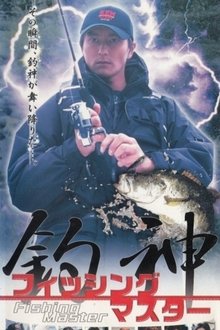
Fishing Master (2002)
This film depicts the battle of a man with miraculous bass fishing skills. Rei Kurokami, also known as the "Bass Eraser", stands up to restore the lake, whose ecosystem has changed due to the construction of Leisure Land.
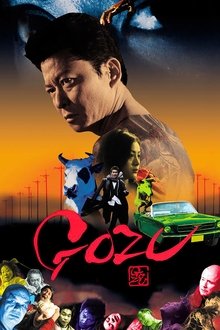
Gozu (2003)
Minami mistakenly kills a gangster associate of his named Brother. Almost as soon as the murder takes place, the body of the deceased man is gone, prompting Minami to conduct a search. While looking, he finds a mysterious isolated hotel where he decides to take a rest. Not only are the front desk clerks a bit strange, but even the ambiance feels unusual. Minami soon realizes he may have gotten more than he bargained for.
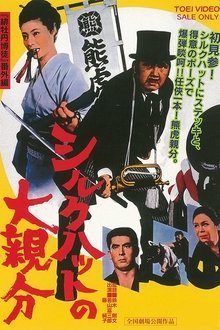
Silk Hat Boss (1970)
In a strange outfit and full of youthful energy, the explosive Boss Kumatora raises hell like there's no tomorrow. The first movie of a new series starring Wakayama Tomisaburo as everybody's favorite character Boss Kumatora from the Red Peony Gambler series. Having made a fortune in the Russo-Japanese War, the Kumatora Family migrates to Kyushu to take on a military-related job. There they encounter the evil and malicious interference of the Chindai family of Kumamoto, and Boss Kumatora boldly fights back with the help of O'Ryu the Red Peony. A super entertaining film with non-stop comedy and action directed by Suzuki Norifumi.

The Bandits (1968)
Action drama about a Japanese gangster in Manchuria circa 1932, who finally joins some Chinese mountain bandits.
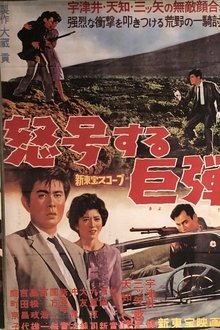
怒号する巨弾 (1960)
At the end of the Greater East Asia War, young Amada Koichi and his father were wrongfully accused as spy suspects and his father died in prison after being tortured. Ten years later, Amada seeks for revenge on the three men responsible for his father death.
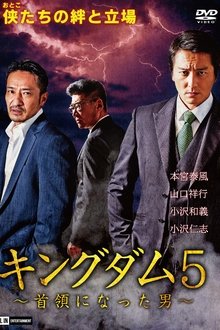
Kingdom 5: The Man Who Became the Leader (2020)
Shimazu Clan's third-generation boss, Tetsuo Sakuragi (Yasukaze Motomiya), and his sworn brother, Kenichi Kanamori (Yoshiyuki Yamaguchi), are set to be released from prison. Although Sakuragi plans to personally welcome his brother's return, Eitoshi Kaji (Hitoshi Ozawa) advises against it. Sakuragi dismisses Kaji's concerns, but Kaji reaches out to Tomomatsu Miwa (Naoki Hongo) of the Miwa Clan for support in convincing Sakuragi. On the day of Kanamori's release, it is Kaji, not Sakuragi, who comes to greet him. Witnessing this, Kanamori’s reaction is…
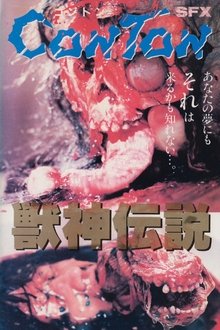
Conton (1987)
A boy's nightmares about being stalked by a demon slowly transform into a terrifying reality.
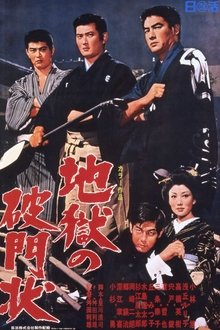
Exiled to Hell (1969)
It is the end of the Taisho era (1912-1926), and at the Hanazuki-tei theatre in Asakusa, the famous performance of storyteller Koiso Kikuji and performer Kataoka Koshin is reaching its climax when the Tawaraya family interferes... This is an entertaining action film bursting with righteousness and humanity, centred on men who try to live righteously against a corrupt boss who preys on the performers.
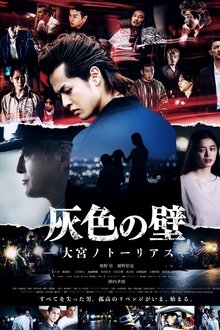
Gray Wall Gear (2022)
The stage of this work is Saitama, a suburb of Tokyo in the early Heisei period. Immediately after the bubble burst gangster countermeasures law, there were gangsters who defended the last territory and young people who freely controlled the city. The youth conflict escalated day by day and became a force that surpassed the yakuza, and the runaways were sent to juvenile prisons one after another, where exclusive rules awaited.

Fireworks (1997)
Beleaguered police detective Nishi takes desperate measures to try and set things right in a world gone wrong. With his wife suffering from leukemia and his business partner paralyzed from a brutal gangster attack, Nishi borrows from a yakuza loan shark and then robs a bank to clear his debt.
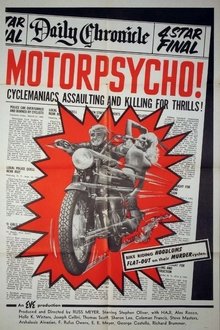
Motorpsycho! (1965)
A vengeful veterinarian and a grieving widow join forces to track down violent bikers after they commit heinous acts against their loved ones.
